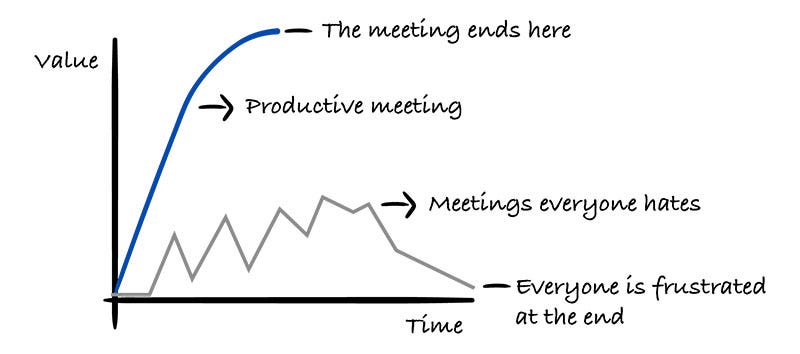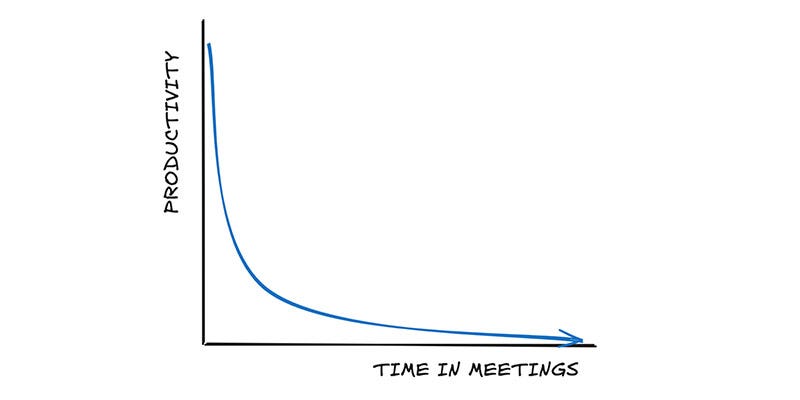Why engineers hate meetings and how to fix it
- Gregor Ojstersek and Michał Poczwardowski from Engineering Leadership <gregorojstersek@substack.com>
- Hidden Recipient <hidden@emailshot.io>
Why engineers hate meetings and how to fix itUse these tips to create meetings that engineers will love to attend!🎁 Giveaway: Course “Senior Engineer to Lead: Grow and thrive in the role” 2 full scholarshipsDecember is all about giving and celebrating! In order to be selected for a scholarship, apply here. I'll be selecting based on the following: Please share this with anyone you feel should apply for a scholarship. For everyone else, who can reasonably afford the course, I invite you to enroll normally here. P.S. I expect to do similar giveaways in the future, so If you're not selected for a scholarship this time round, feel free to apply again. Let’s get back to this week's thought! IntroWe all love the feeling of getting things done. Unfortunately, unproductive meetings are the exact opposite. Our energy is drained after such meetings. I’ve been in countless meetings without a clear agenda, with too many people on the call and time has just passed without any useful outcome. As a manager, one of my main goals is to make meetings as productive as possible. To value everyone's time and make them straight to the point. To ensure we all know how to create such meetings, I am happy to team up with Michał Poczwardowski, experienced engineering manager, mentor and also a writer of Perspectiveship newsletter. Michał is sharing tips on how to create meetings that engineers love attending. Also, I had the pleasure of meeting Michał not so long ago at the Infoshare conference in Katowice, Poland. It’s awesome to meet fellow writers in person! Let’s get straight into it, Michał over to you. There are 3 things that frustrate engineers more than anything
I’ll cover the meeting part today. In my career, I led more than 1,500 one-on-ones and over 200 team meetings with engineers. While meetings often feel unnecessary, they are an important tool when done right. Here's how to fix them. Why engineers hate meetings - the badFor managers, meetings are how we get through the day. We meet to hire people, get updates, create processes, etc. For engineers, meetings are just an addition to their everyday coding. However, unproductive meetings are the number one enemy of engineers:
Why meetings are important - the goodEngineers may hate meetings, but we are social beings. We grew as a species because we talked to each other, we planned together and worked together. A caveman working alone wouldn't have survived for long. Time has changed, so has the way we work, but what was essential to get work done is still there. We need other people to get things done. Meetings create a space where we can update each other and exchange ideas much faster than writing alone. They help us feel like part of the team, learn from each other, and use our combined brain power to solve problems.
Meetings that your engineers will love attendingFollowing these steps will provide a good experience for engineers: 1. Make sure your meetings have a purpose or a goalIf your purpose of having a meeting is: "because the company requires it, every 2 weeks" it's not a good purpose. Purpose can be found by asking:
Having a purpose for meetings, even if not stated aloud but understood by the leader, helps to move things forward. I had one-on-ones that didn’t work and weren’t addressing the purpose which in this case was to: “empower a team of architects within the company”. We changed individual conversations to team meetings and it suited my goal, their goals and the company's goals.
2. Finish the meeting early if its purpose has been fulfilledImagine that all your software runs for exactly one hour each time, regardless of how much time it takes to actually solve the problem. It shouldn’t work like this, so why is finishing a meeting before the end of its scheduled time such a rare thing? Leading a meeting isn’t that different from running efficient software → make sure it ends as soon as the goal has been reached.
3. Ask your engineers about their most productive time and avoid scheduling meetings hereUnderstand how your team works, what is their schedule, and when they are most productive. Then, try to organise meetings with your teams in a way that respects their focus time. For engineers there is a huge distraction cost if their focus gets derailed. 4. Fill the time with updates that are relevant to themThe truth is, how much you talk is not a measurement of productivity. Simply sitting in a meeting does not make it useful. A manager can perceive it as a great use of time, but it might be completely useless for the team members. Don’t assume you know what is interesting to your team. Detailed financial statements that you look at every day might be interesting to you, but they probably won’t motivate your engineers to work harder.
5. Invite only the necessary people to the meetingIt’s OK to omit some people and focus only on the people you need. The rest of the team can read an update after the meeting. It’s also OK not to gather the whole team if you only need to fix something with the help of a few engineers. The others won’t feel excluded.
6. Tailor the meeting to the people attendingPeople are different. We have different styles of communication and an initial set of expectations.
I worked with people who took full ownership of presenting their updates and knew exactly when to ask for guidance, but I also worked with juniors who just followed the templates for the agenda that I prepared. I've never published anything like my own manager's readme on how to talk with me. I assumed it would kill the ability to try new ways of cooperating. Instead, I aimed to talk through expectations during our first meetings. Have an open conversation about the shape of one-on-one meetings with your team members. Allow them to adjust it as needed to suit the purpose, even if it doesn’t align with your preferences. Manage expectations. 7. Pay attention to people while in the meeting with themSome companies operate without any meetings at all. This is rare. While talking to someone in a meeting, in the office or even during a video call, we gather much more data as managers. We hear the tone of their voice and we can see if someone is stressed, overwhelmed, or nervous. For managers, getting more data about our team members is important to better understand them, and get a closer look at how they are feeling. Summary
In order to do this, be sure to apply the following to your meetings:
Last wordsSpecial thanks to Michał for sharing his insights on this important topic! Make sure to follow him on LinkedIn and check out his newsletter Perspectiveship. You can also book him as a mentor here. I definitely recommend to do that if you are looking for a great mentor to help you level up in your career or get some expert advice. Liked this article? Make sure to 💙 click the like button. Feedback or addition? Make sure to 💬 comment. Know someone that would find this helpful? Make sure to 🔁 share this post. Whenever you are ready, here is how I can help you further
Get in touchYou can find me on LinkedIn or X or Bluesky. If you wish to make a request on particular topic you would like to read, you can send me an email to info@gregorojstersek.com. This newsletter is funded by paid subscriptions from readers like yourself. If you aren’t already, consider becoming a paid subscriber to receive the full experience! You are more than welcome to find whatever interests you here and try it out in your particular case. Let me know how it went! Topics are normally about all things engineering related, leadership, management, developing scalable products, building teams etc. Invite your friends and earn rewardsIf you enjoy Engineering Leadership, share it with your friends and earn rewards when they subscribe. |
Similar newsletters
There are other similar shared emails that you might be interested in:





